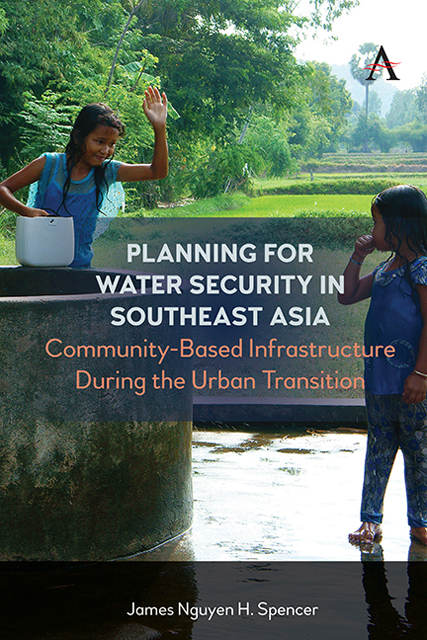 Planning for Water Security in Southeast Asia
Planning for Water Security in Southeast Asia Book contents
- Frontmatter
- Content
- Preface
- Introduction
- 1 Water and Human Security
- 2 Global Urbanization: The Confluence of Peri-Urbanization and Urban Transition
- 3 Community-Based Public Finance of Deep Well Water Systems in Peri-Urban Java
- 4 The Peri-Urbanization of Can Tho and the rise of Entrepreneurial Water Suppliers in the Mekong Delta
- 5 Ha Noi: Bulk Water Retailing in Peri-Urban Areas
- 6 Peri-Urbanization, Co-Production and Institutional Culture: The Case of the Phnom Penh Water Supply Authority
- 7 Beyond Resilience: Are we thinking about Entitlements, Participation and Governance in the Right Way?
- References
- Index
3 - Community-Based Public Finance of Deep Well Water Systems in Peri-Urban Java
Published online by Cambridge University Press: 10 January 2023
- Frontmatter
- Content
- Preface
- Introduction
- 1 Water and Human Security
- 2 Global Urbanization: The Confluence of Peri-Urbanization and Urban Transition
- 3 Community-Based Public Finance of Deep Well Water Systems in Peri-Urban Java
- 4 The Peri-Urbanization of Can Tho and the rise of Entrepreneurial Water Suppliers in the Mekong Delta
- 5 Ha Noi: Bulk Water Retailing in Peri-Urban Areas
- 6 Peri-Urbanization, Co-Production and Institutional Culture: The Case of the Phnom Penh Water Supply Authority
- 7 Beyond Resilience: Are we thinking about Entitlements, Participation and Governance in the Right Way?
- References
- Index
Summary
The transitioning, peri-urban communities of East Java, Indonesia have responded to their challenges of urbanization and societal transformation in innovative ways. Champions of local and informal communities across the Global South have long championed the various acts of resistance and subversion in the face of the encroaching power of national, provincial and municipal states that often combine with the corporate private sector to disempower local and oftentimes politically marginal communities. Stories of such disenfranchisement in the provision of water services is particularly rife in our understanding of urban services. Oliveira and Lewis (2004), in his study of Cochabamba, Bolivia and Bond (2008) in his work on South Africa illustrate the kinds of disenfranchisement that result from state-centric urbanization. Less well documented, however, are the deeply pragmatic grassroots efforts to deal with rapid urbanization and transition.
This chapter details the ways in which local residents in Gresik, Indonesia, have become de facto planners, bankers and engineers. These jacks-of-all-trades coexist alongside rational, expert-based planning professionals in the rapidly urbanizing communities of Gresik, yet they are almost entirely invisible to the formal structures of national and local water governance. Understanding what these grassroots community planners and developers can and cannot achieve sheds new light on some of the policy and governance opportunities inherent to rapid urbanization and development in the Global South.
Indonesia is the world's fourth-largest country with five major islands: Sumatra, Java, Kalimantan, Sulawesi and Papua. As much as 60 percent of the population is concentrated on Java, which makes up only 7 percent of the total land area. From 2000 to 2010, the bulk of Indonesia's population growth was in urban areas as the population grew from 203.5 to 237.6 million and the urban population grew from 85.2 to 118.3 million during that period. The percentage of those living in cities increased from 41.9 to 49.7 percent in the time period from 1970 to 2010, with 68 percent of the population on Java, giving Indonesia the fastest urbanization rate in the Asia-Pacific region at 4.2 percent (Firman, 2012; Ellis, 2012). By 2025, approximately 67.5 percent of the population will be living in urban areas, with the fastest growth taking place in the peri-urban areas outside of Java and Bali (World Bank, 2012).
- Type
- Chapter
- Information
- Planning for Water Security in Southeast AsiaCommunity-Based Infrastructure During the Urban Transition, pp. 65 - 94Publisher: Anthem PressPrint publication year: 2022


